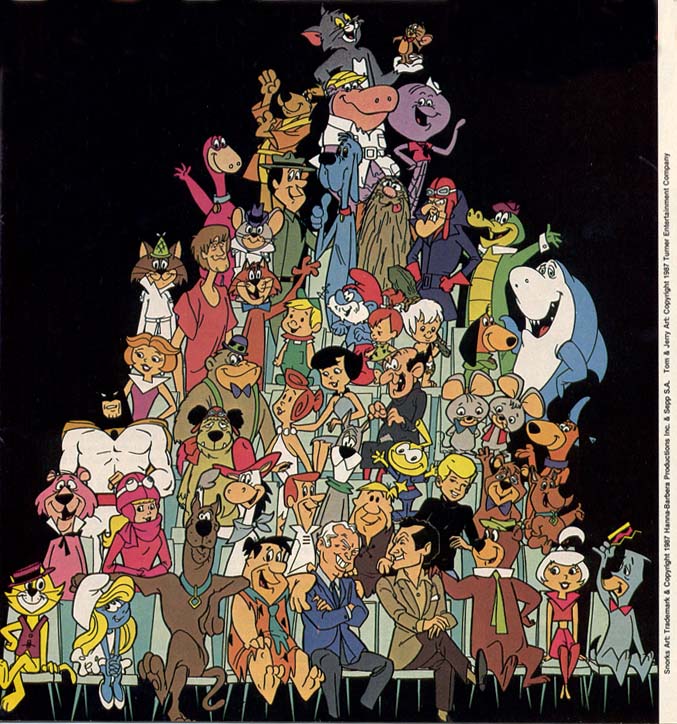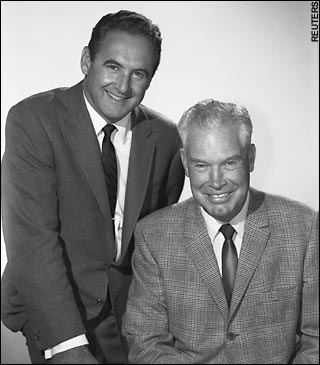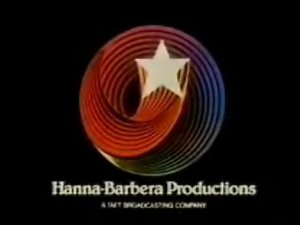
| What is The Jetsons? |
The Jetsons is an animated television series that appeared in prime-time from 1962 until 1963 on ABC. Created and produced by Hanna-Barbera Productions, the series was The Flintstones another Hanna-Barbera cartoon. Unlike The Flintstones, The Jetsons depicted a 21st century futuristic society instead of a pre-historic one.
A former magazine cartoonist, Joseph Barbera joined the MGM studios in 1937- after being rejected by another studio, Disney. William Hanna studied engineering journalism and art before he joined the MGM team. There, Hanna-Barbera was formed. (See their picture, below) They created many memorable cartoons, including Tom and Jerry, Yogi Bear and The Flintstones. Their animation technology evolved over the years as technology improved, and their cartoons are considered classics. The cartoons often followed a very similar pattern, which Stockman describes below: "Many cartoons offer scant background detail but others- notably from the Hanna-Barbera stable- elaborate the environment with sufficient detail to inform the viewer not only of historical and geographical setting, but of abstract information like educational/legal insititutions and social milieu...Cartoons, like other stories have a readily apparent narrative structure which falls roughly into three sections: 1. exposition, initial situation; 2. development, climax; and 3. resolution, settling of conflict" (Stockman). The Jetsons is a terriffic example of these influences, which are typical of Hanna-Barbera cartoons. The show was also very similar to another television genre, the sitcom: "The Flintstones and The Jetsons are essentially sitcoms based on the I Love Lucy formula- albeit with a sci-fi veneer- just as The Addams Family is a sitcom with a horror veneer. The Jetsons and The Flintstones support sitcom values- values which have their roots in a mid-century America, recovering from world war, experiencing the Cold War, undergoing massive suburbanization and awaiting the rise of feminism" (Stockman). In terms of animation, The Jetsons was not unique, just simply perfect for the genre. "Visually, The Jetsons represented no great advance in the art of animation, but it stands as one of Hanna-Barbera's most stylish projects. Hanna-Barbera's decisions to have the characters whisked from place to place via conveyer belt and to have all doors slide open may have been reached to save on animation time, but such choices added immeasurably to the streamlined 21st century texture of the series" (Erickson).
The Jetsons debuted in prime-time on September 23rd, 1962 and aired for only one season, until March 3rd, 1963. After its only season, The Jetsons episodes were re-run in syndication as a part of Saturday morning cartoon lineups. The show became very successful in syndication, and led to more episodes of the show being produced in the 1980s. According to John Javna, the show is best viewed through the context of the 1960s: "When it debuted in 1962, the space race was beginning in earnest. John Glenn, the first American astronaut to circle the Earth, was our national hero; NASA had publicly declared its intentions to put a man on the moon by the end of the decade; space-age products like freeze-dried food and pocket calculators were starting to appear. America was excited by the future- but we were also scared of it. At President Kennedy's urging in 1961, homeowners built fallout shelters en masse. Ad a month after the first episode aired, the world came dramatically close to nuclear war with the Cuban Missle Crisis" (Javna). The show took advantage of greater animation and color technology, introduced new characters and envisioned an even more "futuristic" 21st century when it was revived. These new syndication episodes, produced between 1984 and 1987, also enjoyed great success.An advantage of the cartoon genre, according to Hal Erickson, was the fact that it is a "revival" business and "the characters never grow old and fat". This certainly applies to The Jetsons. It was very easy for producers to bring back the show decades after its initial release. The Jetsons was never as popular as The Flintstones, and did not attract as large an audience, but had a very large following. Made for television films and in 1990, a Hollywood release, resulted largely from the show's popularity in syndication. The show still enjoys this folllowing today, as its episodes can be seen on Cartoon Network's Boomerang regularly.
What do the critics think of The Jetsons? The following comments from critics are taken from John Javna's book, Best of Science Fiction TV. " 'The Jetsons' was reverse 'Flintstones,' but it was better than 'The Flintstones'. The caracters were more fun, George Jetsons being much more likabe than Fred Flintstone (albiet much more of a nebbish). They were both supposed to be sort of satires on modern life, but the Jetsons worked out better because its funnier to see a modern setting extrapolated into the future than it is to see one thrust into the past." -Henry Castleman, Watching TV
"Unfortunately, the future, if we have one, is going to be boring, not adventurous; more suburban than the New Frontier. George Jetson is a role model for the future of man and humanity, where the biggest excitement will be choosing synthetic breakfasts." -Jack Mingo, The Couch Potato Handbook
"Maybe, by making us laugh at the future a little bit, 'The Jetsons' made us a little less afraid of the future" -Mark Dawidziak, Akron Beacon-Journal
"The people who created 'The Jetsons' were probably familiar with the 1939 World's Fair...I remember that my mother used to say 'The Jetsons' reminded her of things she'd seen at the New York World's Fair. The futuristic notions were introducecd there that worked their way into the popular consciousness, and 'The Jetsons' really drew on that." -Pat Cadigan, SF Writer
" 'The Jetsons' appealed to me because it said, no matter how advanced the technology gets, things aren't going to change much. It was as if the Flitnstones were thrust into the future without missing a beat. Oddly, some of the visions of 'The Jetsons'- like moving sidewalks- have actually come to pass." -Barry Garron, Kansas City Star
"My favorite [science fiction special effects] were in the Jetson household; especially the bed that turns into a toaster and pops George out of bed in the morning. Been waiting for that one to come on the market for years!" -Debbi Snook, Cleveland Plain-Dealer
"Science and technology in the Jetsons' world is like magic in the classic fairy tales. Push-buttons just take the place of magic wands. It's 'Poof!' and you've got a meal." -Melissa Schwarz, Harmony Books
In 2004, Season 1 of The Jetsons was released on DVD.
|


